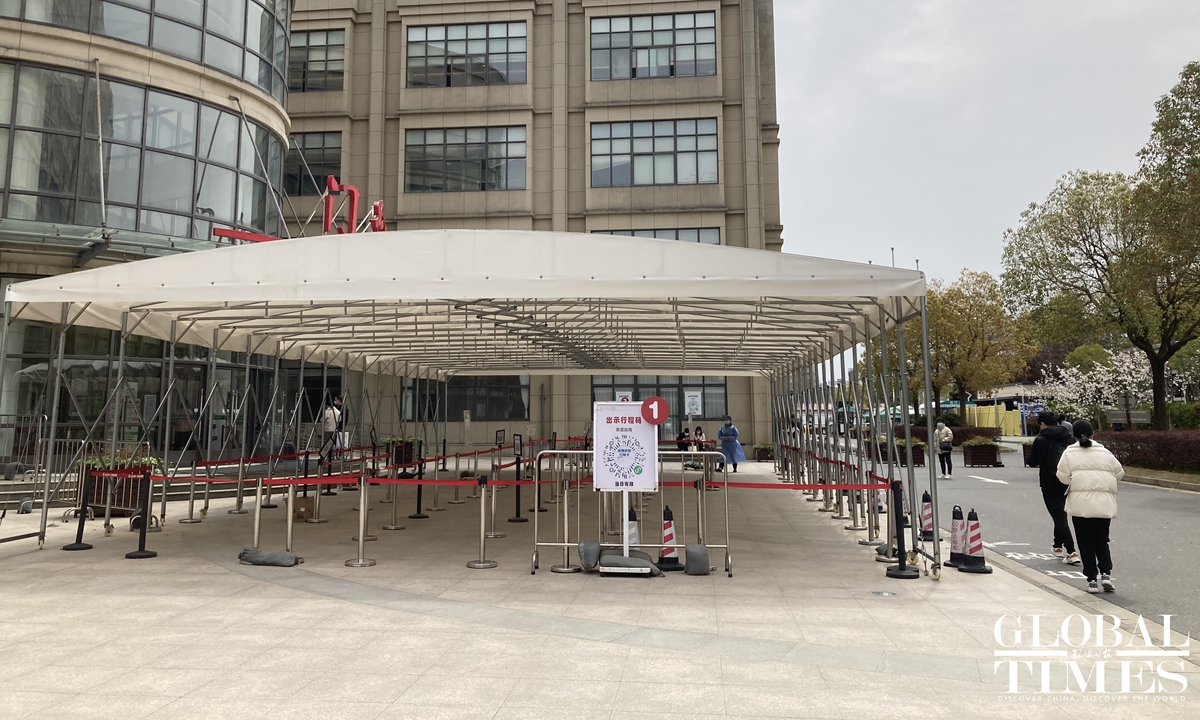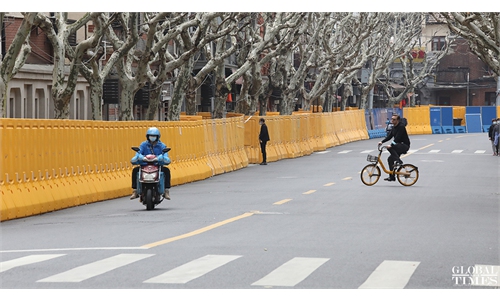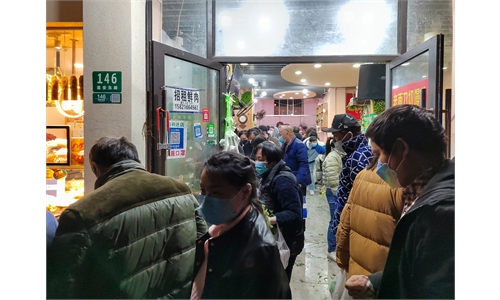Shanghai exchange ‘largely unaffected,’ as industry responds swiftly to ensure operation

The largely empty streets, closed subway stations, and a maternity hospital in normal operation in the locked-down Pudong, Shanghai, on Monday.Photos: Huang Lanlan/GT
China's domestic financial hub of Shanghai has readied its equity market well for strict anti-COVID-19 measures that began on Monday, with the Shanghai Stock Exchange (SSE) pledging to offer cloud-based listing services, among other measures to ensure operations through the local COVID-19 flare-ups.With the SSE's swift response, new share subscriptions planned for this week and the review of new IPO filings will be largely unaffected, industry insiders said. Business operations of local brokerages will be mostly intact, as it's easy for their staffers to work from home, they disclosed.
The flagship Shanghai Composite Index edged up 0.07 percent to close at 3,214.5 points on Monday, after going a wild ride throughout the day. The tech-heavy ChiNext index shed 1.66 percent.
In a statement on Sunday night, shortly after the metropolis announced closed-off management first in Pudong before Puxi taking its turn, the SSE said the review of filings for IPOs and major asset reorganizations on the STAR Market in Shanghai would proceed normally via video link, among other means.
The bourse encouraged new share issuers to arrange IPO dates in line with realities. The SSE will offer free livestreaming of IPO ceremonies and support physical bell ringing events later on as the virus effect dissipates, read the statement, which listed 30 measures to keep the market going amid the local virus outbreak.
The SSE's quick response will mean stable market operations, Wu Jinduo, head of fixed income at the research institute of Great Wall Securities in Shanghai, told the Global Times on Monday.
The planned subscriptions for nine new listings this week as well as the review of new IPO applications would be largely unaffected, Wu said.
Online subscriptions for two new share offerings on Monday - electronic test equipment maker RIGOL Technologies on the STAR Market and Shanghai Karon Eco-valve Manufacturing on the ChiNext board in Shenzhen - were normal.
"It's likely that the goal of dynamic zero-COVID would be achieved in Shanghai in a short time after the rollout of a new round of citywide screening and a differentiated approach to manage the situation, based on the practice of other provinces and cities," Wu said.
IPO-related services will get back to normal quickly, the analyst said.
The robustness of the domestic financial hub seems evident amid the strict anti-epidemic measures.
"We're now mostly working from home, as the bank's outlets in Pudong are all closed while some of its outlets in Puxi remain open," an employee with a bank in Shanghai told the Global Times on Monday.
An employee with a venture capital firm in Puxi told the Global Times on Monday that the firm has aligned its operations with anti-epidemic requirements.
Local financial institutions would have had their IT systems well-prepared, the employee said.
There are high requirements for financial infrastructure, ranging from clearing and trading to settlement in fund firms' case, so many of their staffers in Pudong rushed to their offices overnight, according to Wu.
Brokerage firms are asset-light and staff-intensive, so they can cope with employees working from home, Wu said.
Investment banking services of securities firms such as IPOs, debt issues and bond sales can be done online, while research reports could be written at home, and road shows, stockbroking and wealth management can also be conducted online, she explained.
Some staffers have been assigned to quantitative trading, among other services in the secondary market that might necessitate office working, analysts said.
Meanwhile, China-US audit talks are also weighing on investor sentiment. Observers who keep a wary eye on the progress of the talks have maintained a cautious tone.
In light of the US regulatory toughening, a gradual delisting of Chinese firms on US exchanges seems inevitable, Hong Hao, managing director and head of research at BOCOM International, told the Global Times on Monday.
But delisting won't necessarily be a problem for the equity market, given China's large role in the global economy, Hong remarked.
New regulations unveiled Friday that paved the way for IPOs via Chinese Depositary Receipts (CDRs) on the Shanghai and Shenzhen exchanges as part of the country's financial opening-up will help overseas-traded Chinese firms shift their listings to the domestic market, he said.
Some US-listed Chinese firms and investment institutions attended a video event on Sunday hosted by China's securities regulator, where market participants gave input into recent moves of Chinese concept stocks, the China Securities Journal reported on Monday.
Chinese and US regulators are meeting each other halfway and striving for a solution to the audit issue, to provide effective and sustainable cooperation as soon as possible, according to the report.



